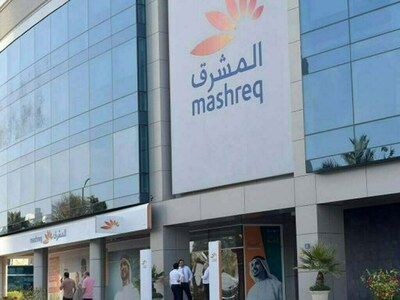Mashreq Bank’s Digital Transformation Plan for Pakistan
Mashreq, a Dubai-based global digital bank, intends to revolutionize Pakistan’s banking sector by shifting from traditional brick-and-mortar branches to digital platforms.
A core element of its expanded operations in Pakistan involves a significant project focused on digitizing the flow of remittances from Pakistani workers in the UAE and other countries, with the goal of connecting overseas Pakistanis with their families domestically.
“Mashreq is highly focused on facilitating the inflow of worker remittances into Pakistan,” stated Muhammad Hamayun Sajjad, CEO of Mashreq Pakistan.
Pakistanis residing in Dubai and other parts of the UAE remit approximately $6.25 billion to $6.50 billion annually to their families in Pakistan. Mashreq already manages a substantial portion of these remittances in partnership with other financial institutions.
“We are establishing a rapid, convenient, and transparent financial channel between Mashreq Dubai and Mashreq Pakistan to ensure immediate receipt of remittances. Currently, Mashreq Dubai handles remittance processing, and our initial objective is to transfer this process to our Pakistan-based platform,” Sajjad explained.
“Our secondary aim is to identify and resolve the challenges in the remittance process within Pakistan. By understanding these obstacles, we seek to improve the overall user experience. We recognize a significant opportunity to streamline remittances, which represent a crucial financial lifeline for the nation.”
Mashreq has six decades of expertise serving individuals and businesses in major global markets, including the Middle East, the US, the UK, and Europe. It is currently conducting a pilot project in Pakistan, with the aim of launching a fully operational retail digital bank in the country by the close of December 2025.
Mashreq Dubai manages three entities in Pakistan: Mashreq Bank (in its pilot phase), Mashreq Global Network (responsible for employee hiring and management), and a branch office of Mashreq Financial Institutions Group (offering banking solutions to other financial institutions). The combined investment in Pakistan over the past four years has exceeded $70 million and is projected to reach $100 million by the end of this year.
Trade Finance
In addition to remittances, the bank is actively involved in trade finance, according to Sajjad. “Although our Pakistan license does not yet permit trade transactions, Mashreq Dubai continues to manage trade flows with Pakistani banks. The bank ranks among the top six global financial institutions for US dollar clearing and serves as a trade hub across 14 nations.”
Upon obtaining full licensing in Pakistan, Mashreq intends to extend its trade services locally within three to five years. In the interim, its focus remains on establishing efficient and dependable financial corridors between the UAE and Pakistan, he added.
Dedicated Portals for SMEs and Youth
Currently, most banks serve SME clients through platforms designed for individual or corporate clients, often overlooking the specific requirements of small businesses. To address this, Sajjad stated that Mashreq is introducing Mashreq Neo Business—a dedicated app and portal tailored exclusively for SMEs.
For individual clients, Mashreq will also provide digital joint accounts, eliminating the need for branch visits. Furthermore, the bank is launching Mashreq Neo NXT, a separate digital platform for youth under 18. While minors cannot open full bank accounts, Neo NXT will enable supervised banking for savings and spending, managed by parents, promoting financial literacy from an early age, the CEO added.
Cybersecurity and AI as Keys to Success
Mashreq emphasizes a strong cybersecurity infrastructure supported by advanced AI-driven monitoring and fraud detection. The bank aligns its systems with State Bank of Pakistan (SBP) regulations for digital banking, including controls for unusual transactions. Automated alerts, such as calls for transfers exceeding Rs2 million, enhance customer protection.
Leveraging its digital infrastructure from the UAE, Mashreq plans to replicate this model in Pakistan to foster trust and credibility in the evolving digital banking sector.
Sajjad noted that Mashreq sees a significant opportunity in Pakistan’s digital banking gap. SBP data indicates that Pakistan has 90–100 million account holders, but only 20 million use online banking, leaving 70 million largely untapped. Existing banks face high costs and limited digital efficiency, while users continue to encounter challenges related to fraud, access, and reliability. A modern, digital-only bank like Mashreq can efficiently and cost-effectively fill this gap.
Nearly 500 Pakistan-based professionals, including 43% senior staff, work remotely for Mashreq Dubai across 18 cities without a local office.
Mashreq Pakistan operates with 250-300 staff compared to the thousands employed by conventional banks. Operating remotely—without physical branches—and with fewer employees significantly reduces banking costs.
Mashreq also recognizes the rapid expansion of Pakistan’s e-commerce sector over the last 12 to 15 years. Consumer behavior demonstrates a strong shift towards digital purchases over traditional retail.
The bank sees potential in this trend, anticipating that increased digitization of payments will ultimately drive e-commerce growth. Mashreq’s infrastructure and partnerships can support the evolving ecosystem of e-commerce payments, logistics, banks, and platforms to ensure seamless consumer adoption, Sajjad concluded.



Comments (0)
No comments yet. Be the first to comment!
Leave a Comment